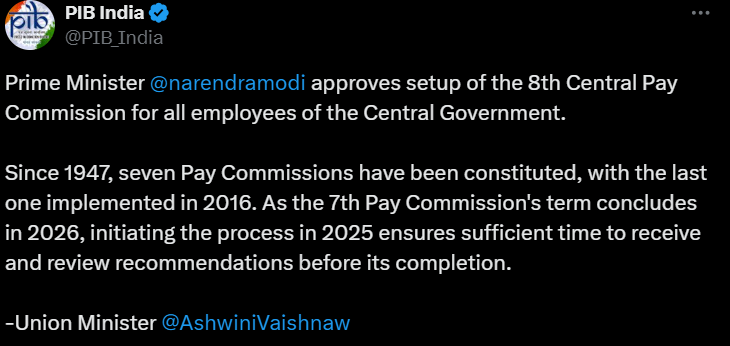

8th Pay Commission: The Union Cabinet has approved the constitution of the 8th Pay Commission. Once implemented it will increase the salaries of around 50 lakh Central government employees after revision.
The 8th Pay Commission will be led by a chairman and two members, who will be appointed shortly. It is anticipated that the commission's recommendations will be submitted before the conclusion of the 7th Pay Commission's term in 2026 .
What is 8th Pay Commission?
The Union Cabinet approved the establishment of the 8th Pay Commission on January 16, 2025 . It is a proposed body in India that will review the salaries, allowances, and pension benefits for all Central Government employees. Its goal is to address inflation and enhance financial stability for both employees and retirees. The commission will focus on increasing the basic pay and allowances for over 50 lakh central government employees and 65 lakh pensioners. The 8th Pay Commission will be formed after a ten-year gap since the implementation of the last commission in January 2016. The term of the 7th pay commission is ending in December 2025.  Source: Social Media Platform 'X'
Source: Social Media Platform 'X'
What is a Pay Commission?
A Pay Commission is a government-appointed body that reviews and recommends changes to the salary structure of government employees. It takes into account factors like the cost of living, inflation, and overall economic conditions to ensure employees are fairly compensated. The first Pay Commission was established in 1946 , and since then, seven commissions have been constituted to ensure that government salaries remain fair and competitive in light of economic conditions.
8th Pay Commission Date
The 8th Pay Commission is expected to be implemented from January 1, 2026. The Indian government approved its formation on January 16, 2025. This follows the usual ten-year cycle between pay commissions, with the previous one being implemented in 2016.
8th Pay Commission Employees Salary Hike
The 8th Pay Commission is expected to bring a significant salary hike for central government employees starting January 2026. The minimum basic salary may increase from Rs. 18,000 to around Rs. 41,000, reflecting a 34.1% rise due to a fitment factor of 2.28. Additionally, the Dearness Allowance (DA) is expected to merge with the basic pay, which will help improve take-home salary and overall benefits. This revision aims to enhance the financial well-being of over 48 lakh employees and nearly 68 lakh pensioners, addressing inflation and economic needs effectively.
8th Pay Commission Pay Matrix
| Pay Commission | Fitment Factor | Increase in Basic Pay |
| 7th Pay Commission | 2.57 | Basic pay was multiplied by 2.57. |
| 6th Pay Commission | 1.86 | Basic pay was increased by 1.86 times. |
| 5th Pay Commission | 40% of existing basic pay | 40% of basic pay in the scale was added to existing emoluments. |
What is the Fitment Factor?
The fitment factor is an important multiplier used in India to calculate revised salaries and pensions for central government employees and pensioners. It is applied to the current basic pay or pension to determine the new pay structure based on the recommendations of a Pay Commission.| Example: Let’s say the Current Salary is 18,000 and the Fitment Factor is 2.57 So, New Salary = Current Salary × Fitment Factor = 18,000 × 2.57 = 46,260 |
8th Pay Commission Salary Structure
The 8th Pay Commission salary structure will be confirmed after recommendations are made public. Experts are recommending a significant increase in the minimum salary at each level of the pay matrix, based on factors like inflation and the consumer price index. The salary structure will comprise:- Revised Basic Pay
- Dearness Allowance (DA)
- House Rent Allowance (HRA)
- Promotion and Pay Scale Adjustments
- Other Allowances such as travel, medical, and education allowances.
8th Pay Commission Salary Calculator
The 8th Pay Commission Salary Calculator will be a useful tool for government employees to estimate potential salary changes. By entering their current salary details, employees can get projections for adjustments in basic pay, dearness allowance (DA), house rent allowance (HRA), and other relevant components. In summary, the 8th Pay Commission will make important changes to the pay structure for central government employees in India.| UPSC Related Articles | ||
| UJALA Scheme | HMPV Virus | Maha Kumbh 2025 |
| IMD 150th Foundation Day | National Sports Awards | SpaDeX Mission |